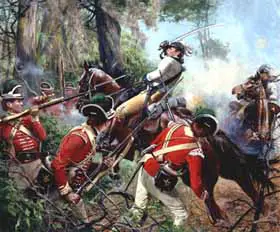Colonial Wars |
American Wars |
Link To This Page — Contact Us —
The Battle of Eutaw Springs
September 8, 1781 at Eutawville, South Carolina
 |
||||||
|
The Battle of Eutaw Springs was the last engagement of the war in the Carolinas.
On May 22, Gen. Nathaniel Greene of the Continental Army attempted to storm the strong British post at Fort Ninety-Six but was repulsed.
On September 8, he attacked the British again at Eutaw Springs, South Carolina. In the first part of the action, Greene was successful after a desperate conflict; in the pursuit, however, the Americans failed to dislodge the British from a stone house which they held, and their severe loss in both engagements was over 500 men. The British lost about 1,000, one-half of whom were prisoners.
Better success attended the American partisan operations directed by Greene and conducted by Francis Marion, Thomas Sumter, Andrew Pickens, Henry Lee, and William Washington. They fell upon isolated British posts established to protect the Loyalist population, and generally captured or broke them up. Rawdon found himself unable with his diminishing force to cover the country beyond Charleston; and he fell back to that place, leaving the situation in the south as it had been in the early part of 1780.
On the American side, Greene was hailed as the deliverer of that section. Seven years of British determination to bring South Carolina to her knees met failure.
By midsummer, 1781, the Continentals under Gen. Nathaniel Greene had gained virtual control of South Carolina. The retreating British. disillusioned and sick with summer heat, united forces under Col. ?? Stewart at Orangeburg and began their march to Charleston.
Early in September, the 2,300 well-equipped British camped in cool shade beside the gushing springs of Eutaw, little dreaming the Continentals were close upon their heels. Greene, hearing of Gen. George Washington's plan to encircle and embarrass the British at Yorktown, determined to prevent Southern aid from reaching the beleaguered Cornwallis. Contingents under Marion, Pickens, Lee, William Washington, Hampton and other South Carolina leaders were called together, and reinforcements from other colonies joined them.
On September 7, these 2,092 poorly-equipped, underfed, and near-naked Americans camped on the River Road at Burdell's Plantation, only 7 miles from Eutaw Springs. Strategy for the ensuing attack is accredited to the genius of the dreaded Gen. Francis "Swamp Fox" Marion. He knew every foot of the Santee swamps and river.
On September 8, dawned fair and intensely hot, but the Americans, on short rations and with little rest, advanced in early morning light toward the springs. At their approach the surprised British left their uneaten breakfast and quickly threw lines of battle across the road in a heavily wooded area. Behind them in cleared fields stood a large brick home with a high-walled garden. The woods and waters of Eutaw Creek were on the north. Heavy firing soon crackled and boomed through the shady woods. At first the center of the American line caved in, but while opposing flanks were fighting separate battles, Greene restored the center with Sumner's North Carolina Continentals. The whole British line then began to give, but Stewart quickly pulled up his left-flank reserves, forcing the Americans to retreat under thunderous fire. The encouraged British shouted, yelled, and rushed forward in disorder; whereupon Greene "brought in his strongest force: the Maryland and Virginia Continentals, Kirkwood's Delaware's, and Wm. Washington's South Carolina cavalry . . . with devastating effect."
The British fled in every direction and the Americans took over their camp. Only Maj. ?? Majoribanks, on the British right flank and pushed far back into the woods near Eutaw Creek, was able to hold his unit together. Major Sheridan took hasty refuge in the brick home, Colonel Stewart gathered some of his men beyond, and from this vantage they "picked off" many American officers and men.
Greene sent Col. William Washington's cavalry to deal with Majoribanks, but penetrating the woods with horses was too difficult, so Washington tried to encircle and rout, thus exposing himself to dangerous fire. His horse was shot from under him, he himself was wounded. and his company practically ravaged. When a hand to hand fight developed, a British soldier poised his sword over the wounded Washington, but Majoribanks saw and gallantly turned it aside.
In camp, eating the deserted breakfast, and feeling the battle was won, the hungry, thirsty Americans began plundering the English stores of food, liquors, and equipment. Thoroughly enjoying themselves they ignored their leaders' warnings and commands. Majoribanks, realizing the disorder, fell upon them. Sheridan and Stewart pounded at their right, and Coffin came in from their left. The stunned Americans fought this impossible situation bravely, but they were put to flight from the British camp.
After more than 4 hours of battle, both armies had had enough. Casualties were extremely high. "Blood ran ankle-deep in places," and the strewn area of dead and dying was heart-breaking. Greene collected his wounded and returned to Burdell's Plantation. Stewart remained the night at Eutaw Springs.
On September 9, Stewart hastily retreated from Eutaw Springs toward Charleston, leaving behind many of his dead unburied and seventy of his seriously wounded. The gallant Majoribanks, wounded and on his way to Moncks Corner, died in a Negro cabin on Wantoot Plantation. He was buried beside the road.
Many of the men who were killed were buried where they fell. This last major battle in South Carolina completely broke the British hold in the South and, more importantly, it denied needed aid to the British forces in the North. Only 6 weeks later, Cornwallis succumbed to Gen. george Washington at the Battle of Yorktown, and American Independence was assured.

